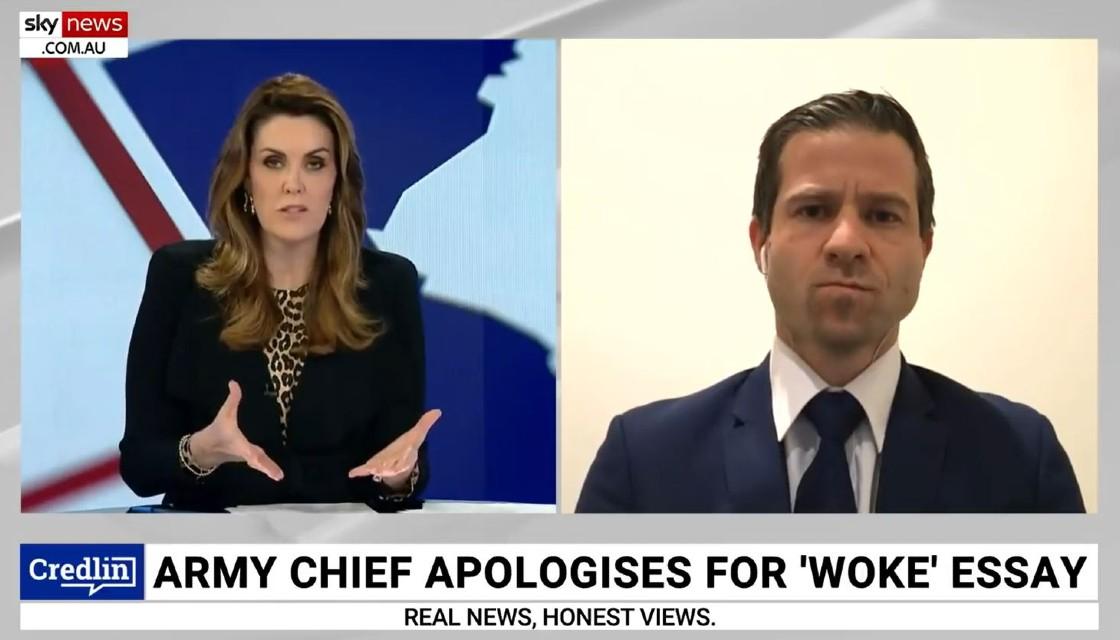National's Chris Penk has gone on Australian television to say he's "embarrassed" for New Zealand that Defence Minister Peeni Henare weighed in on the removal of a controversial essay from an Army website.
The essay, titled 'Can the Army Afford to go Woke, Benign Social Progress or National Security Threat', was last week awarded a prize in the Chief of Army Writing competition and published on the Knowledge-Enabled Army (KEA) website.

Rallying against "woke culture" and arguing the Army "cannot reconcile a more diverse and inclusive workforce with the maintenance of a warrior ethos and war-fighting culture", the text pushed back on "identity-based notions of Diversity".
However, this week it was removed from the website and replaced with a message from Chief of Army Major General John Boswell apologising "to all those who saw publication of this essay as an endorsement of the views that were contained within it".
It then emerged that Henare had spoken to Chief of Defence Air Marshal Kevin Short about the piece, reminding him of the Defence Force's commitment to diversity and inclusion.
That sparked anger from National and ACT MPs, who accused the minister of interference and for having his priorities out of whack.
But Henare's office later confirmed to Newshub that his conversation with Short came after the piece was removed and the minister had no involvement with the decision to take it down. He didn't give any instructions to Short.
On Friday night, Penk, National's Defence spokesperson, went on Sky News' Credlin show, to express his frustration.
"It is quite extraordinary, and the really interesting thing is that the soldier has been proven correct. Cancel culture, of course, being a key aspect of the wokeness against which he was railing in the first place," he told host Peta Credlin, the former Chief of Staff to former Australian Prime Minister Tony Abbott.
"Quite extraordinary really, when you think as well, the Government minister, the Defence minister no less, has seen fit to weigh in and have his two cents' worth, not that he had read the thing."
Penk was staggered.
READ MORE
- Peeni Henare 'had no involvement' in removing controversial Defence Force essay
- Army chief to meet with staff upset over anti-diversity essay
- Army gives anti-diversity essay award, then removes it after backlash
- Defence Force staff publicly outed for declining Covid-19 vaccination
"I am a bit embarrassed, to be honest, from the perspective of New Zealand that our reputation is such that our allies can open the proverbial newspapers and see that the Defence Minister's priority in an area of the world in which there is so much going on, regional tensions."
Penk shared the interview on Facebook and had the support of his National colleagues in the comments section.
"Well done Chris. Thanks for speaking up against this nonsense," said Simeon Brown.
"Good interview, Chris Penk MP. It's an increasingly worrying trend of behaviour from this government," said Tim van de Molen.
Last term, the Defence role was held by New Zealand First's Ron Mark. But since Labour's landslide electoral victory last year, it's been in Henare's hands and Labour has expressed a desire to "put our fingerprint" on the portfolio, as Prime Minister Jacinda Ardern put it.
Stuff last week reported Henare was in discussions with Finance Minister Grant Robertson on the plan for Defence spending, but noted that it had been impacted by COVID-19. He said plans weren't to scrap projects, but instead push them out.
In his message, Boswell said the essay was chosen as the winner as "it was the most well-written of the submissions received within that category".
"The intent of the Chief of Army's writing competition is to encourage Army personnel to think deeply about subjects, to gain experience in writing formal essays and to encourage debate.
"I will always listen to the opinions of others, particularly those of our soldiers. And I think it is important that we seek to understand where other views exist.
"In this particular case however, it has been made clear to me that publishing this essay was viewed as undermining both the inclusive culture we are seeking and the work that is being done across all ranks to effect this change – work that is incredibly important, not just to me, but to our organisation."






